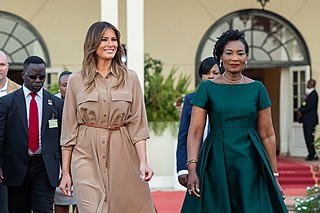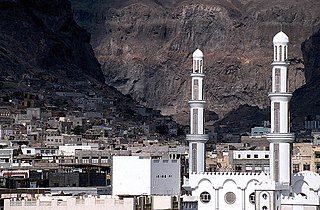Related Research Articles

Boutros Boutros-Ghali was an Egyptian politician and diplomat who served as the sixth Secretary-General of the United Nations from 1992 to 1996. An academic who previously served as acting foreign minister and vice foreign minister of Egypt, Boutros-Ghali oversaw the UN over a period coinciding with several world crises, including the Breakup of Yugoslavia and the Rwandan genocide. He went on to serve as the first Secretary-General of La Francophonie from 1997 to 2002.

The United States President's Emergency Plan For AIDS Relief (PEPFAR) is a United States governmental initiative to address the global HIV/AIDS epidemic and help save the lives of those suffering from the disease. Launched by U.S. President George W. Bush in 2003, as of May 2020, PEPFAR has provided about $90 billion in cumulative funding for HIV/AIDS treatment, prevention, and research since its inception, making it the largest global health program focused on a single disease in history until the COVID-19 pandemic. PEPFAR is implemented by a combination of U.S. government agencies in over 50 countries and overseen by the Global AIDS Coordinator at the United States Department of State. As of 2021, PEPFAR has saved over 20 million lives, primarily in Sub-Saharan Africa.

Peace and conflict studies is a social science field that identifies and analyzes violent and nonviolent behaviours as well as the structural mechanisms attending conflicts, with a view towards understanding those processes which lead to a more desirable human condition. A variation on this, peace studies (irenology), is an interdisciplinary effort aiming at the prevention, de-escalation, and solution of conflicts by peaceful means, thereby seeking "victory" for all parties involved in the conflict.

The Global Fund to Fight AIDS, Tuberculosis and Malaria is an international financing and partnership organization that aims to "attract, leverage and invest additional resources to end the epidemics of HIV/AIDS, tuberculosis and malaria to support attainment of the Sustainable Development Goals established by the United Nations". This multistakeholder international organization maintains its secretariat in Geneva, Switzerland. The organization began operations in January 2002. Microsoft founder Bill Gates was one of the first donors to provide seed money for the partnership. From January 2006 it has benefited from certain US Privileges, Exemptions, and Immunities under executive order 13395, which conferred International Organizations Immunities Act status on it.

Giles Scott-Smith is Dutch-British academic. He is a professor of transnational relations and new diplomatic history at Leiden University and serves as the dean of Leiden University College The Hague.
Alan Walter Whiteside OBE is a South African academic, researcher and professor at the Balsillie School of International Affairs and professor emeritus at the University of KwaZulu-Natal. He is well known for his innovative work in the field of the social impacts of HIV and AIDS.

Health policy can be defined as the "decisions, plans, and actions that are undertaken to achieve specific healthcare goals within a society". According to the World Health Organization, an explicit health policy can achieve several things: it defines a vision for the future; it outlines priorities and the expected roles of different groups; and it builds consensus and informs people.

The United States established diplomatic relations with Malawi in 1964 after Malawi gained independence from the United Kingdom. Malawi's transition from a one-party state to a multi-party democracy significantly strengthened the already cordial U.S. relationship with Malawi. Significant numbers of Malawians study in the United States. The United States has an active Peace Corps program, Centers for Disease Control and Prevention, Department of Health and Human Servicess, and an Agency for International Development (USAID) mission in Malawi. Both countries have a common history and English language, as they were part of the British Empire.

The diplomatic relationship between the United States of America and Zambia can be characterized as warm and cooperative. Relations are based on their shared experiences as British colonies, both before, after and during the struggle for independence. Several U.S. administrations cooperated closely with Zambia's first president, Kenneth Kaunda, in hopes of facilitating solutions to the conflicts in Rhodesia (Zimbabwe), Angola, and Namibia. The United States works closely with the Zambian Government to defeat the HIV/AIDS pandemic that is ravaging Zambia, to promote economic growth and development, and to effect political reform needed to promote responsive and responsible government. The United States is also supporting the government's efforts to root out corruption. Zambia is a beneficiary of the African Growth and Opportunity Act (AGOA). The U.S. Government provides a variety of technical assistance and other support that is managed by the Department of State, U.S. Agency for International Development, Millennium Challenge Account (MCA) Threshold Program, Centers for Disease Control and Prevention, Department of Treasury, Department of Defense, and Peace Corps. The majority of U.S. assistance is provided through the President's Emergency Plan for AIDS Relief (PEPFAR), in support of the fight against HIV/AIDS.

Perry N. Halkitis is an American of Greek ancestry public health psychologist and applied statistician known for his research on the health of LGBT populations with an emphasis on HIV/AIDS, substance use, and mental health. Perry is Dean and Professor of Biostatistics, Health Education, and Behavioral Science at the Rutgers School of Public Health.
Global Health Initiatives (GHIs) are humanitarian initiatives that raise and disburse additional funds for infectious diseases – such as AIDS, tuberculosis, and malaria – for immunizations and for strengthening health systems in developing countries. GHIs classify a type of global initiative, which is defined as an organized effort integrating the involvement of organizations, individuals, and stakeholders around the world to address a global issue.

United Nations Security Council resolution 931, adopted unanimously on 29 June 1994, after recalling Resolution 924 (1994) on the civil war in Yemen, the Council considered the findings of the fact-finding mission deployed to the country and demanded a ceasefire.
Colin John McInnes is Pro Vice Chancellor at Aberystwyth University and holds a personal professorial chair in the Department of International Politics there, where his research focuses on global health politics. He is a Fellow of the Academy of Social Sciences and a Fellow of the Royal Society for the Arts. In 2014 he was appointed by the Secretary of State for International Development as a Non-Executive Director of the UK National Commission (UKNC) for UNESCO, with special responsibility for the Social and Human Sciences, and represents the UK on UNESCO’s Social and Human Sciences Commission. He was elected Chair of the UKNC in 2019 and in this role works closely with the British government, UNESCO designations and UNESCO HQ in Paris. In 2017 he received the Special Achievement Award at the inaugural Wales Social Research awards, for his 'outstanding personal achievement in research'.
The Centre for Health and International Relations (CHAIR) was founded (2003) in the belief that there are compelling reasons for linking international relations, foreign policy, security and health. CHAIR is based in the Department of International Politics, Aberystwyth University, Aberystwyth, Wales. The founder and director is Professor Colin McInnes.

United Nations Security Council Resolution 1983 was adopted unanimously on June 7, 2011, after recalling meetings on HIV/AIDS in Africa and in the mandates of peacekeeping operations, as well as resolutions 1308 (2000), 1325 (2000), 1820 (2008), 1888 (2009), 1889 (2009), 1894 (2009) and 1960 (2010). The Council encouraged the inclusion of HIV/AIDS prevention, treatment, care and support in its peacekeeping mandates.
Joseph Camilleri is an Australian citizen of Maltese descent. He is a social scientist and philosopher. In philosophy he mostly specialised and interested in international relations.
Dr Luiz Loures was the Deputy Executive Director, Joint United Nations Programme on HIV/AIDS (UNAIDS). He was appointed to this position at the level of Assistant Secretary-General of the United Nations by the United Nations Secretary-General Ban Ki-moon on 14 December 2012.
Seed Global Health, formerly known as Global Health Service Corps, is a non-profit organization started in 2011 which helps to provide nursing and medical training support in resource-limited countries. Seed Global Health collaborates with the Peace Corps to create the Global Health Service Partnership (GHSP). This program has established the first "Peace Corps for doctors and nurses". Since launch, GHSP has had 97 volunteers train more than 8,300 students in 5 African countries.

Anja Mihr is a German political scientist and human rights researcher. She works in the areas of Transitional Justice, Cyber Justice, Climate Justice, Governance and Human Rights Regimes. She is an internationally known academic who has taught in various universities in Germany, the United States, Italy, China and the Netherlands. Her main work focuses on human rights, governance and transitional justice, looking at the interlinkage between institutions, organizations and the way human rights realization can be leveraged.

Health security is a concept that encompasses activities and measures across sovereign boundaries that mitigates public health incidents to ensure the health of populations. It is an evolving paradigm within the fields of international relations and security studies. Proponents of health security posit that all states have a responsibility to protect the health and wellbeing of their populations. Opponents suggest health security impacts civil liberties and the equal distribution of resources.
References
- ↑ "Medicine, Conflict and Survival". Routledge. Retrieved 1 June 2011.
- ↑ "'Partnerships and Foundations in Global Public Health". Palgrave Macmillan. Retrieved 1 June 2011.
- ↑ "'Framing AIDS: Securitization, Development-ization, Rights-ization'" . Retrieved 1 June 2011.